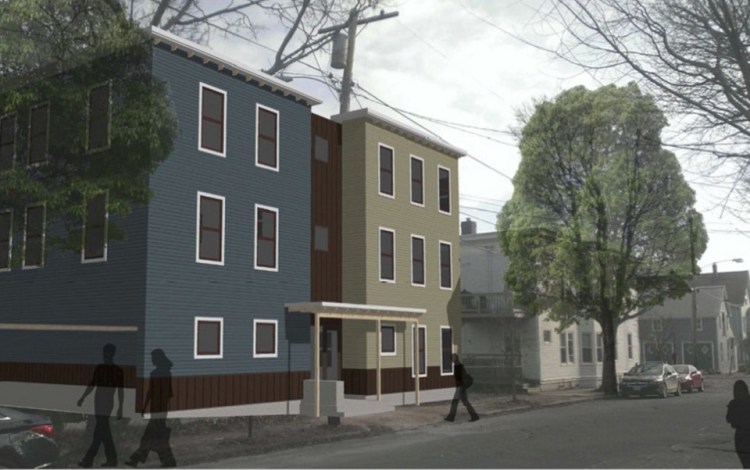A developer and the city of Portland are teaming up to convert a small city-owned parking lot on Munjoy Hill into condominiums priced far below market rate for the neighborhood.
The eight-unit, three-story building is planned for 65 Munjoy St., on the last open portion of the former Adams School property. Plans call for two three-bedroom units, two two-bedroom units, and four one-bedroom units.
While construction of condominiums is common in the white-hot real estate market on Munjoy Hill, where market-rate units can easily fetch as much as $650,000, units of this building will be priced roughly between $235,000 and $300,000, said Peter Bass, the developer partnering with the city.
“Everybody is talking about how do we deal with this middle-income (housing),” Bass said. “It’s a small step, but it’s a good step.”
The units will be restricted to people who earn between 100 percent and 120 percent of the median income, which for a single person in Portland is roughly between $52,000 and $62,000, or for a family of four, between $73,900 and about $88,700.
Those limits are set by the federal Department of Housing and Urban Development.
“This kind of in-fill (development) is really important,” said Portland Mayor Ethan Strimling, who was not involved in the deal but was briefed on its highlights. “We’ve got to find a way to maximize city property and provide opportunities for responsible developers to do good work. And this sounds like a good match.”
Munjoy Hill has become a practical and symbolic example of Portland’s runaway housing market, where low supply and high desirability continue to squeeze out middle-income families that can’t afford to rent or buy at the sky-high prices the neighborhood now commands.
In contrast, only two or three decades ago, Munjoy Hill was seen as a run-down neighborhood unworthy of development dollars.
The city, for its part, has vowed to do what it can to give developers incentives to build housing for a range of income levels – a monumental task, considering the limits of what city governments can do to control an open market.
Bass said this project has been in the works for about a year.
Only because the city owns this property can it set some of the terms, including a provision attached to the building’s deed that will ensure that the units can’t be sold at market rate for years to come.
The trade-off is that buyers will not gain the equity they otherwise would in a home or condo appreciating on the open market, Bass said.
The project was submitted for site plan review Monday, and could receive final approval from the planning board in January, with construction to begin in the spring.
Some caveats remain, however.
The city is virtually giving Bass the land for free, according to the developer, because Bass has agreed to clean up pollutants on the site.
But he will not foot the entire remediation bill.
He said a substantial portion of the funding for the cleanup will come from a grant administered by the Department of Environmental Protection and the Greater Portland Council of Governments. Bass declined to disclose the amount of the grant or the sale price of the land.
For the property to be eligible to receive the money, it must be held by a nonprofit. So during the cleanup the city will transfer temporary ownership of the parcel to the Portland Housing Development Corporation. When the site is ready for construction, it will be sold to Bass.
The cleanup grant and the nominal price tag are what allow Bass to sell the units below market rate, he said.
“Remember, number one, it’s a toxic site that needs work, and number two, the reason they do that is so we can reduce the price of the units so they’re significantly below market value,” he said.
Send questions/comments to the editors.





Comments are no longer available on this story